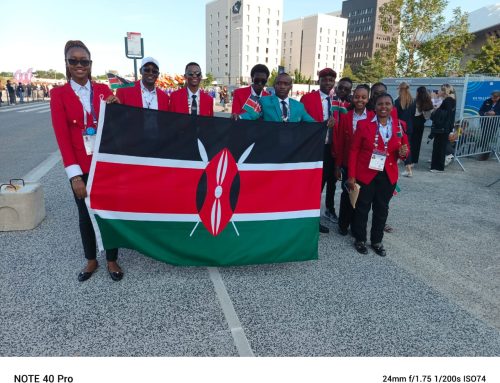By Dr. Kipkirui Langat

TVET Authority CEO Dr Kipkirui Langat (left), Australian Deputy High Commissioner to KenyaJonathan Ball, David Kozar from Queensland University of Technology office of Commercial Services, TAFE Queensland International Development Advisor Bridget Gray and Australian Awards Program Manager Caroline Mbugua pose for a photo at the embassy during a courtesy call.
TVETA in partnership with Queensland University of Technology and Queensland will implement TVET training under Australia Awards Africa (AAA) implemented by for a period of 3 years.
The TVET Act of 2013 has vested on the Technical and Vocational Education and Training Authority (TVETA) the responsibility to accredit all the persons involved in training in the TVET sector to ensure quality of training.
The law has also tasked the Authority to advice on the development of Schemes of Service for trainers and the development of standards and guidelines for training and assessment in the TVET sector.
It is within this legal backing that the TVET Authority has set out to increase a critical and relevant pool of expert trainers in a number of skill-sets to ensure there is quality.
One of the things the Authority has developed to ensure the delivery of job ready graduates is the development of Trainer Qualification Framework, a proposed set of guidelines designed to be used during training, recruitment and maintenance of quality trainers in both public and private TVET institutions.
A qualification framework provides quality assurance by ensuring that all qualifications on offer at educational institutions are authorized by accrediting agencies. This framework sets accreditation indicators for each qualification level and establishes equivalencies between qualifications at all levels.
All over the world, qualifications frameworks based on learning outcomes is one of the tools that has been used to reform and expand educational and training provision in ways that will raise skills levels, improve labour market productivity and contribute to sustainable development.
The trainer should have the following minimum competencies. Competence to plan a training session, deliver competency-based training (CBET) and be able to conduct competence assessment; and maintain training facilities and ensure internal quality assurance.
After successful licensing, the trainers shall be required to renew their training license periodically with evidence of Continuous Professional Development (CPD) as required by the Authority. These regulations form the basis for the proposed Qualification Framework for TVET trainers.
To support the trainers in meeting the requirements of CBD, TVETA is currently coordinating two international projects on short courses for trainers. The first project is a course under Australia Awards Africa (AAA) implemented by Queensland University of Technology and Queensland TAFE for a period of 3 years.
This course includes three separate courses which fulfil different training and assessment needs. The TVET Trainer Course and the TVET Assessor Course provide learners who have a vocational background, the skills to train or assess learners in their area of expertise. The TVET Advanced Trainer and Assessor Course gives learners the skills to take up a leadership role within a training organisation, enterprise or industry. Successful completion provides participants with a Certificate of Completion for each course, recognised by International Skills Training and the Australian Government.
The course will be delivered over a period of twelve weeks, with the first cohort of trainers from Africa converging in Nairobi in August 2019 for the first three weeks of course delivery. The training will cover three modules on Competency Based Training and Assessment in TVET, Assessment tools and processes, and Training Delivery Skills. Thereafter, the trainers will have six weeks of home-based applied learning where they will be supported in the application of their learning through online tutorials and webinars. The trainers will spend the final three weeks at TAFE International, Brisbane, Australia where they will be trained on TVET leadership, Development of programmes and resources, and Development of TVET professional.
The second project on Strengthening Agriculture TVET Teacher Training in Kenya and the Netherlands will be running for 3 years with the support of the Dutch government. The project will be implemented by Egerton University, Kenya Technical Trainers College (KTTC) and Aeres University of Applied Sciences in Netherlands together with a consortium of private sector partners from Kenya and the Netherlands.
The project provides for ATVET teacher training improvement and strengthening at the university and TVET level. This will be achieved through; teacher training curriculum improvement; agriculture training curriculum improvement; design and implementation of ATVET teacher training traineeship programmes and workplace-based learning programmes at selected ATVET institutes and private sector companies; and capacity building of teachers and trainers.
Others include institutionalization and strengthening of the collaboration with private sector to support curriculum development, traineeship programmes, workplace-based learning, overall intensified dialogue and cooperation through the (e-)portal and cooperation for the development of joint financing mechanisms; and improving quality assurance mechanisms.
The project concept and design are based on CBET, ICT and blended learning, 21st century learning skills, entrepreneurship development, gender sensitiveness, and Good Agriculture Practices (GAP) responding to labour market needs, sustainability and the establishment of long-term partnerships.
It is expected that the two projects alongside other ongoing initiatives will go along way in supporting capacity building of trainers to meet the requirements of the qualification framework. TVETA will continue engaging other partners to support CPD for trainers in order to achieve a critical number of highly qualified and motivated trainers required for the development of competent workforce.
The writer is the Director Genera/CEOl of TVET Authority
langat.langat@teva.go.ke

